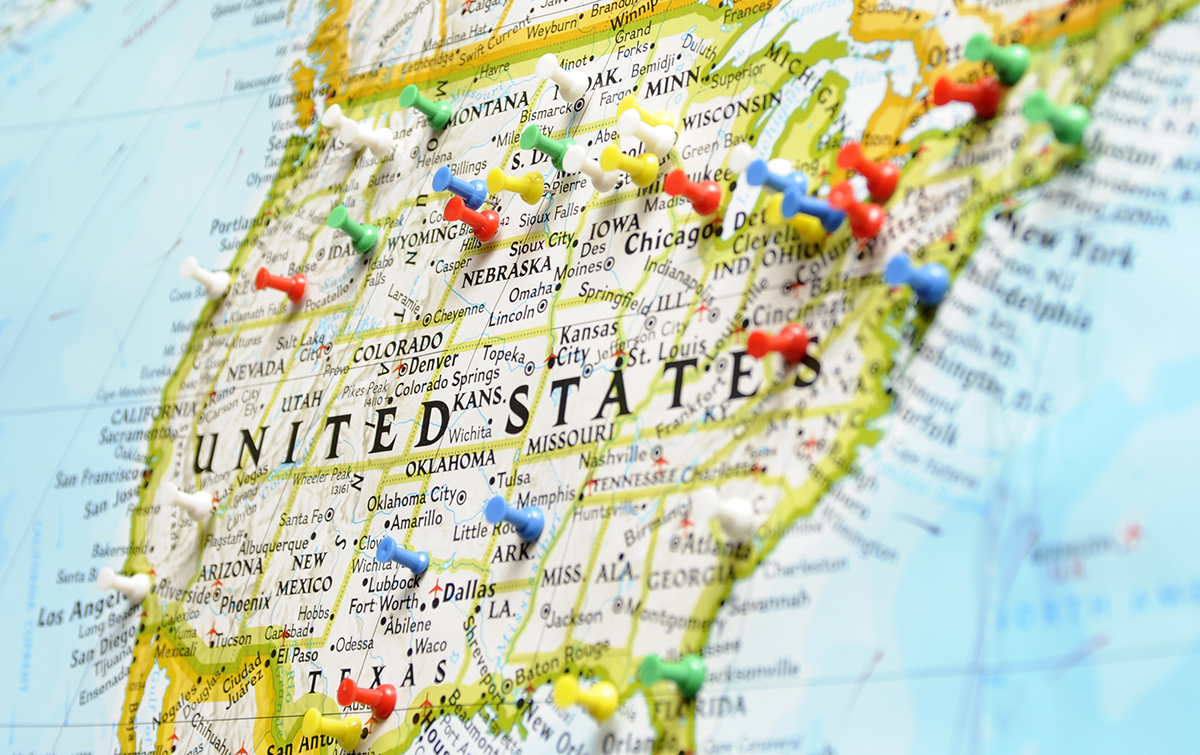
Don’t Miss Out on Valuable State R&D Tax Credits Part 1
Posted by Jeffrey Feingold on 02.08.23
CPAs and taxpayers familiar with the Federal R&D tax credit program may not be fully aware of the scope of state R&D credits available across the United States. About forty states have their own R&D tax credit programs, with some as or even more valuable than the Federal credit program. Unlike the Federal program, some of the state credits are refundable (refunds in excess of the amount of a taxpayer’s tax liability), some are transferable/salable by the taxpayer claiming the credits to other taxpayers in the same state, and still some are in states with attractive credit “buy back” opportunities.
Listed below are just a few of the interesting state R&D credit programs.
Arizona
The state of Arizona makes R&D tax credits available to individuals and businesses that conduct research activities within the state. The state follows the federal guidelines for calculating wages, supplies, and contractors. Similar, the base period is aggregated in much the same way as federal, however only sales within the state of Arizona are utilized.
Administered exclusively by the Arizona Department of Revenue using Arizona Form 308 or 308-1(https://azdor.gov/forms/tax-credits-forms/credit-increased-research-activities-corporations), the state’s R&D program was originated in 1992 for corporations and in 1999 for individuals.
What is the AZ Tax Credit Rate?
- 2011 through 2017: The tax credit is equal to 24 percent of the first $2.5 million in qualifying expenses plus 15% of the qualifying expenses in excess of that amount
- 2018 and after: The tax credit rate will be 20% of the first $2.5 million of “qualified research expenses” plus 11% of the qualifying expenses in excess of $2.5 million
To learn more about AZ’s R&D tax credits, see related blog here:
http://taxpointadvisors.com/blog/view/can-your-business-benefit-from-arizonas-rd-tax-credit-program
California
The California Research Credit reduces the income or franchise tax of those taxpayers who engage in qualified research activities in California. Qualified research expenses generally include wages, supplies and contract research costs. Since 1987, the credit rate for basic research has doubled from 12% to 24% and the rate for qualified research has increased from 8% to 15%.
Provisions of the California Research Credit include:
- Taxpayers will receive 15% of the excess of current year research expenditures over a computed base amount (regular credit only)
- To receive a California Research Credit, a corporation must be allowed a research credit for the taxable year against federal income tax
- Taxpayers may carry over any unused amount to future years until none remains
- Controlled group members may assign credit to an affiliated corporation that is a member of the same group
- California does not conform to the Alternative Simplified Credit (ASC) but it does allow an election for the Alternative Incremental Research Credit (AIRC)
- The California Research Credit can be claimed using
To learn more about CA’s R&D tax credits, see related blog here:
http://taxpointadvisors.com/blog/view/california-offers-valuable-rd-tax-credit-incentive
Connecticut
The state of Connecticut allows C corporations to claim both an incremental AND non-incremental research and development tax credit for R&D expenses paid or incurred by the corporation within the state. The definition of qualified research expenses for both credits are expenses that may be deducted under IRC § 174 and basic research payments defined under IRC § 41.
Incremental R&D Credit
- The tax credit is equal to 20% of the incremental increase in R&D expenses that are conducted in Connecticut.
- This tax credit may be carried forward for up to 15 years.
- Partially refundable for taxpayers whose gross income does not exceed $70 million AND have no tax liability.
- Non-incremental R&D Credit
- The tax credit is equal to up to 6% of the current year's R&D expenses dependent on gross receipts.
- The credit is 5% for companies employing between 251 and 800 employees within the state.
- This credit may be carried forward indefinitely.
The amount of the credit is based on the amount of qualified research and development expenditures in Connecticut, as follows:
- $50 million or under, 1%
- Over $50 million but not over $100 million, $500,000 plus 2% of the excess over $50 million
- Over $100 million but not over $200 million, $1.5 million plus 4% of the excess over $100 million
- Over $200 million, $5.5 million plus 6% of the excess over $200 million
An exception is made for a qualified small business, which is allowed a tentative credit equal to 6% of research and development expenses. For such purposes, a qualified small business is a company with a gross income for the previous income year that does not exceed $100 million and that has not met the gross income test through transactions with a related person.
Massachusetts
The Massachusetts research and development tax credit may be available to any business corporations subject to the corporate excise tax. Expenses must be incurred within the state and the credit closely parallels the federal research credit.
Businesses qualify for the credit if they paid or incurred qualified research expenses while conducting qualified research in Massachusetts. You claim the credit on the return for the taxable year you incurred the qualified expenses. Unused credits may be carried forward for 15 years.
New Jersey
The state of New Jersey, which offers a tax incentive for R&D investment for both manufacturers and R&D companies, allows a qualified business enterprise to claim a state R&D tax credit for qualified research expenses (QREs). A tax credit for increased research activities is allowed based on qualified expenditures made in taxable years beginning on and after Jan. 1, 1994. To receive a New Jersey R&D tax credit, the corporation must be allowed a research credit for the taxable year against federal income tax for qualified research expenses under s. 41, IRC. Click here to view federal forms (https://www.irs.gov/forms-instructions). The New Jersey R&D tax credit closely resembles the federal credit program; however, it specifically offers qualifying New Jersey companies many unique features for doing business in New Jersey.
New Jersey provides a credit of 10% of the excess QREs over a base amount plus 10% of the basic research payments. The New Jersey R&D tax credit is allowed based on qualified expenditures made in taxable years beginning after 1993. If the research credit cannot be used because of tax liability limitations, it may be carried forward for either seven or 15 years as follows:
- Any unused R&D tax credits can be carried forward for seven years
- A taxpayer that has been allowed an R&D tax credit for the fiscal or calendar accounting period (tax year) in which the qualified research expenses have been incurred, and basic research payments have been made, for research conducted in New Jersey in the fields of advanced computing, advanced materials, biotechnology, electronic device technology, environmental technology and medical device technology, are allowed to carry forward the tax credit for 15 years
Property and expenditures included in the calculation of the R&D tax credit are not permitted to be included in the calculation of the following tax credits:
- Recycling Equipment Tax Credit
- Manufacturing Equipment
- Employment Investment Tax Credit
- New Jobs Investment Tax Credit
New York
The New York research and development (R&D) tax credit represents an outstanding opportunity for taxpayers to receive credit for qualified research expenses (QREs) they conduct. While New York does not have a stand-alone R&D tax credit program like many other states, the opportunity for valuable tax credits exists within the state’s overall Excelsior Jobs Program.
As one of several refundable credits available in the state of New York to reduce income tax, the New York Excelsior R&D credit program is one of the best tax credits in the Northeast. New York’s Excelsior Jobs Program encourages businesses to expand in and relocate to New York while maintaining strict accountability standards to guarantee that businesses deliver on job and investment commitments.
To qualify for any of the four programs under the New York Excelsior Jobs Program, businesses must meet and maintain certain established job and investment thresholds.
Excelsior Jobs Program Eligibility
To qualify for the New York Excelsior Jobs Program, which includes R&D tax credits, projects must meet the criteria for job creation, job retention and significant capital investment. The following additional eligibility rules apply:
- Scientific R&D firms creating at least five net new jobs
- Software development firms creating at least five net new jobs
- Agriculture firms creating at least five new jobs
- Manufacturing firms creating at least 10 net new jobs; also manufacturing firms that retain at least 10 employees are also eligible to apply for participation in the program
- Financial services (customer service) back office operations creating at least 50 net new jobs
- Back office firms creating at least 50 net new jobs
- Distribution firms creating at least 75 net new jobs
- Music production firms creating at least five net new jobs
- Entertainment companies creating at least 100 net new jobs
- Other firms creating at least 300 net new jobs and investing at least $6 million
- Firms in strategic industries that make significant capital investment that have at least 25 employees
To learn more about NY’s R&D tax credits, see related blog here:
http://taxpointadvisors.com/blog/view/what-to-know-about-new-york-rd-tax-credit-opportunities
Pennsylvania
Administered by the Pennsylvania Department of Revenue, the state’s R&D tax credits are available to businesses incurring qualified expenses for R&D within the state of Pennsylvania. Qualified businesses, including pass-through entities, can apply the tax credit against personal income tax or the corporate net income tax liability.
Qualified expenditures may include:
- Wages for qualified services
- R&D supplies
- Payments for research to qualified organizations
While the Pennsylvania research credit is similar to the federal R&D credit in terms of determining which activities qualify for the credit, there are some differences, including:
- Pennsylvania has a pool of research credits available, currently set at $55 million. Of that amount, $11 million is reserved for small businesses.
- The state’s credit rate for companies with assets over $5 million is 10%; for qualified small businesses with assets under $5 million, the credit rate is 20%.
- The taxpayer must have qualified research expenses (QREs) in at least one preceding tax year.
- Unused research credits may be carried forward for 15 years.
- The Pennsylvania tax credit may not be carried back and is not refundable.
- The credit is transferrable and “sellable”.
- Expenditures incurred in a Keystone Opportunity Zone (KOZ) are not eligible for the Pennsylvania R&D tax credit.
Tax Point Advisors, works with small to midsize businesses that may qualify for federal and state R&D tax credits nationwide. To learn more about whether your industry and company activities qualify for the R&D tax credits, call (800) 260-4138 or please leave us a message below.



